Growing up around land-mines: How the Falklands conflict shaped me
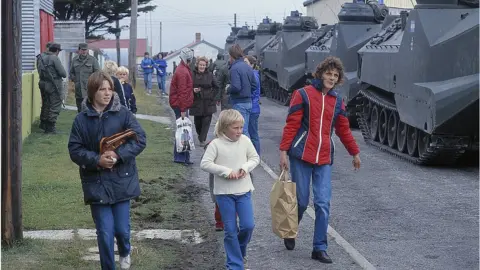 Getty Images
Getty ImagesOn Friday 2 April 1982, Argentina invaded the British overseas territory of the Falkland Islands.
It had claimed sovereignty over the islands for many years. The country's ruling military junta did not believe that Britain would attempt to regain the islands by force.
The ruling military junta was wrong.
Britain, under Prime Minister Margaret Thatcher, assembled warships, refitted merchant ships and sent a task force 8,000 miles (12,900 km) across the globe to the South Atlantic.
Over the next 10 weeks, 649 Argentine military personnel, 255 British military personnel, and three Falkland Islanders were killed.
Forty years on, Tamsin McLeod, an islander who grew up in the shadow of the conflict and now lives in London, tells the BBC what her homeland means to her - and how the island families coped with their peaceful lives being thrust into the arena of war.
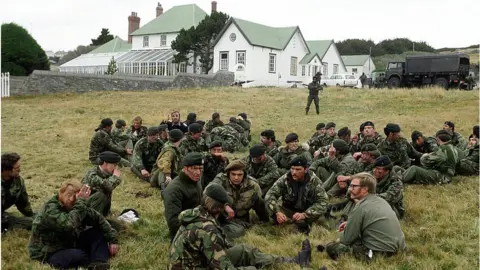 Getty Images
Getty Images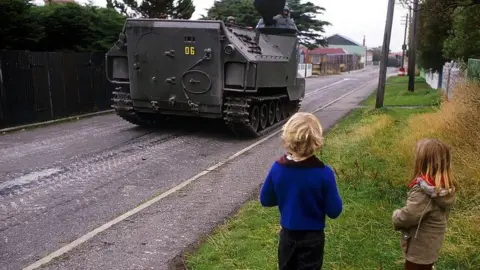 Getty Images
Getty Images"Our nickname is 'Kelper' because of all the seaweed and kelp surrounding the islands, so I'm a Kelper or Falklander first and British second, and on the islands we are so, so eternally grateful for what the British did. I probably wouldn't be here today if that task force had not been sent.
"My parents didn't really talk about it to me much as I grew up.
"It was something that happened, where you have the Liberation Day and the parades and the receptions, and you attend them and everything. And it's very personal.
"But the older I've become the more my parents have opened up about it. My parents would say in passing, 'oh, yeah, your aunt and uncle were locked in the Goose Green town hall for 30 days'."

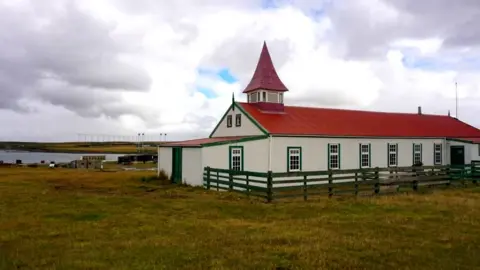
During the war more than 100 islanders were held at gunpoint and imprisoned in the community hall at Goose Green. They had been summoned to a meeting there by Argentine officials. They were kept at the hall, in appalling conditions, for nearly a month.
In just two months of hostilities in the Falklands, 891 men died, 132 aircraft were lost, and 11 ships were sunk.

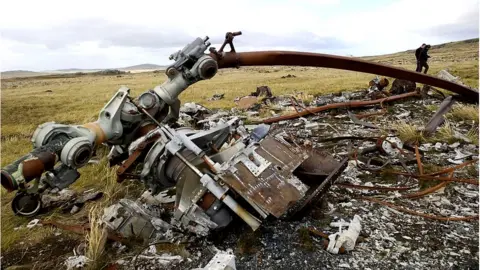 Getty Images
Getty Images"It was always there. It's always in the background. It's the legacy of the conflict - especially with the landmines. It was completely normal to be surrounded by bits of land you couldn't go on, fenced off because there were landmines and if you step on one you could die.
"So going on a walk, it was like, 'oh, yeah, here's wreckage from a helicopter or something from the war'.
"When the invasion happened, my mum was completing her O-levels. Imagine these being interrupted for three months, because you're being occupied and you're being told you have to learn everything in Spanish.
"All of a sudden, you have to drive on the opposite side of the road, you've got a curfew.
"My mum really, really vividly remembers Argentine soldiers turning up at her doorstep because my granddad was the local butcher at the time, and they were like, 'you need to kill mutton and feed us'.
"And my granddad - he was born in England, he vaguely remembers the Second World War, and he did his national service before moving to the islands. And so he's like, 'I'm not putting my family at risk'. So he shipped his whole family out to Horseshoe Bay, which is another farming settlement in the middle of nowhere.
"And that's my mum's main experience of the war - her dad being genuinely fearful."
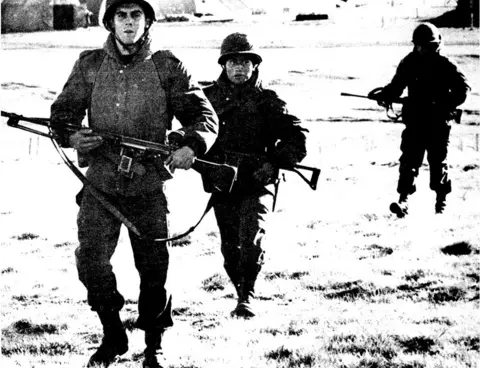 Getty Images
Getty Images
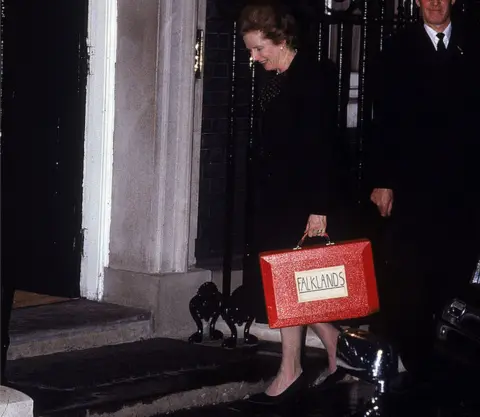 Getty Images
Getty ImagesMargaret Thatcher addressed the House of Commons on 3 April:
"We are here because for the first time for many years British sovereign territory has been invaded by a foreign power.
"After several days of rising tension in our relations with Argentina, that country's armed forces attacked the Falklands yesterday and established military control of the islands … By late afternoon yesterday it became clear that an Argentine invasion had taken place and that the lawful British government of the islands had been usurped.
"There is not a shred of justification and not a scrap of legality to the invasion. The Falkland Islands and their dependencies remain British territory - no aggression and no invasion can alter that simple fact.
"It is the government's objective to see that the islands are freed from occupation and are returned to British administration at the earliest possible moment."

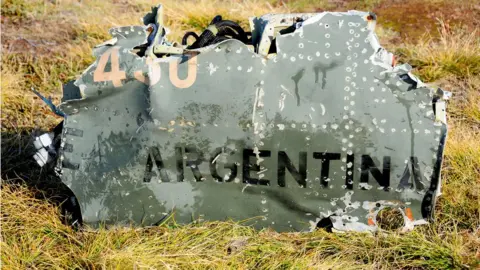 Getty Images
Getty Images"My dad is slightly older. He turned 18 in April during the conflict, he and his brother were helping feed and cook for the British soldiers. They gave their car, their motorbike, the jeep. People stayed on their floor. They were trying to do as much as they could.
"My dad was a young man at that time and there were people his age dying, soldiers dying.
"You couldn't really escape it. But then in a positive way, you appreciate how lucky you are, how privileged you are. To call yourself a Falkland Islander, to be six generations to grow up here, to have a childhood surrounded by penguins and beaches, to have insanely good fresh air."
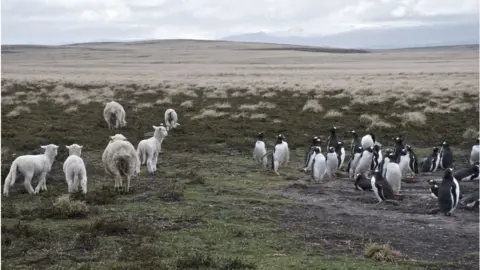 Getty Images
Getty Images"The way I grew up, it was 'appreciate what you've got, because we could have really not had this'.
"When I came to the UK, people knew nothing about the Falklands, genuinely nothing. Especially people my age.
"Occasionally some mention penguins - and sometimes you meet a friend's parents in their 40s or 50s and they remember the conflict.
"It's like, 'I remember hearing about it on the radio or seeing it on the television. Wasn't there a war in the 80s? Wasn't Margaret Thatcher involved?'
"That's all they knew."
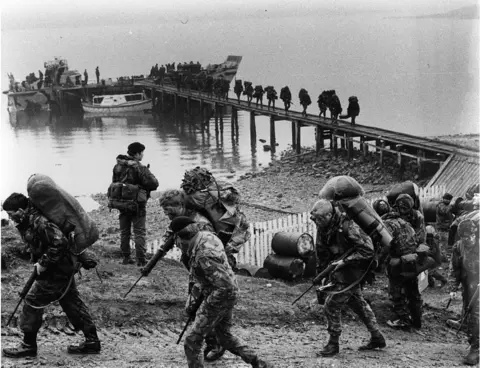 Getty Images
Getty Images"I grew up there, it's my home. So it was completely normal. I didn't know anything different until I moved away and then went, 'oh, hang on a second, there's a whole wide world here'.
"There's still such a strong, strong feeling. My parents are still really close with lots of veterans. They're genuinely family friends.
"My godmother lost her son on the Sir Galahad. She came to the Falklands to see where he lost his life. And it's terrible, terrible circumstances. I don't think a mother should ever have to do that. And she stayed with my family and returned to the island several times since that original visit.
"And because of that relationship, she became a really important part of my life."
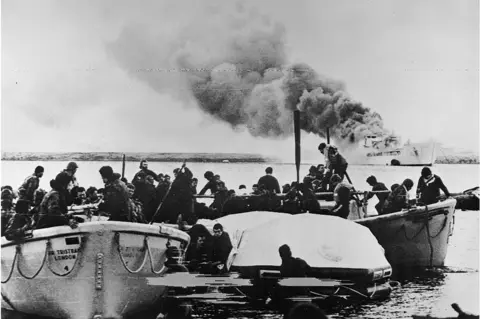 Getty Images
Getty Images
On 8 June, while preparing to unload soldiers from the Welsh Guards in Port Pleasant, RFA Sir Galahad was attacked by the Argentine Air Force, each carrying three Mk 82 500lb (227kg) bombs.
Sir Galahad was hit by two or three bombs, which exploded and started fires. The explosions and subsequent fire caused the deaths of 48 crew and soldiers.

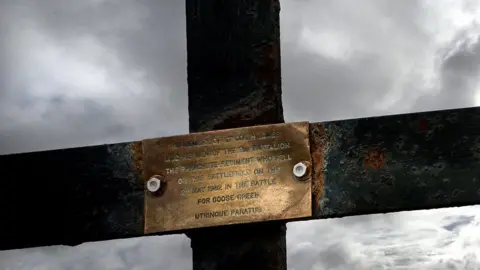 Getty Images
Getty Images"People should care about the war. People lost their lives.
"We are very resilient. We fight for what we believe in and we really want to continue to fight to be British.
"The island has moved on from the war. We have made the most of the sacrifices lost. We still remember the past and we appreciate everything that's happened. But we're looking to the future now.
"We do not have a positive relationship with Argentina at all. It's not civil at all.
"We are not just statistics and geography - we have heritage, we have history, we have lived experiences that are very valuable to us.
"We're becoming the gateway to Antarctica on that entire side of the world, which is amazing. We're the scientific hub of the South Atlantic. We have more than 60 different nationalities, including a growing population from Zimbabwe due to the de-miners coming and removing the landmines, so we are really cosmopolitan. And we're really proud of that.
"I probably will go back. It's home. It's where my family are. I love going home and visiting them and seeing friends. It's a lot slower.
"That soil is my home. So I carry a piece of it with me wherever I go. My necklace has Falklands sand in it and I promise you, it does not come off. Ever.
"The Falklands are a part of me and I'm a part of them."
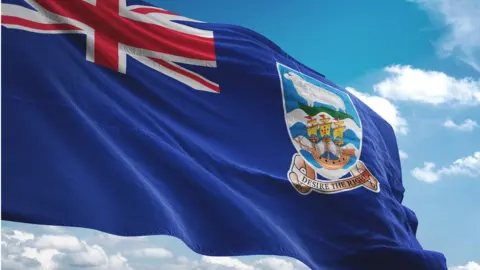 Getty Images
Getty Images
Tamsin's story is taken from My Moment in History - a BBC Local Radio podcast focusing on people whose lives have been affected by the Falklands War.
- Growing up around land mines - Hear Tamsin discuss growing up around landmines and the legacy of the war
- The 'Love Boat' - How a civilian ferry crew ended up playing a part in the conflict
- Paratrooper PTSD - Tam Noble describes the Battle of Mount Longdon - one of the conflict's fiercest confrontations


Follow BBC London on Facebook, Twitter and Instagram. Send your story ideas to [email protected]
